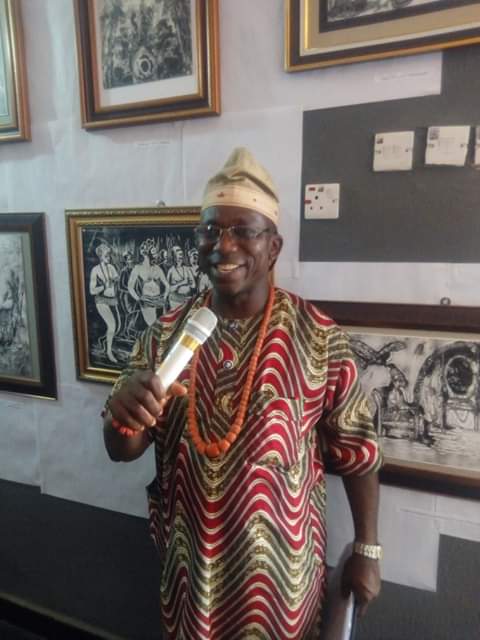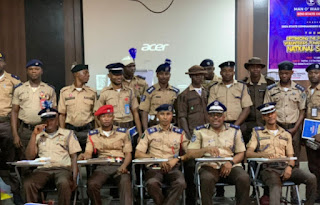Spotlight on Esan Philosophy
The Allegory of the Calabash Okpan "Plate" in Esan Ontology: adding value to what you have got
By Matthew Izibili, PhD
How I wish the statement credited to my Economics teacher, that human wants are insatiable is understood by all, it would have reflected in the way most of us relate with others and handle our God given goodies. In Ancient Philosophical pontifications, we may have heard or read about the Allegory of the Cave traceable to the enigmatic Plato.
Those in the cave as it were, never understood that reality is not same with appearance. This helps us to know that things are not usually the way they seem to be. Hence, it is morally wrong to judge people by what you barely see them put on. Ukpon gue-uza! Uza in Esan is a discussion for another day pls.
Yesteryears, Esan have the near resemblance of the present day breakable plates/dishes. For lack of linguistic understanding, we proudly called the Oyibo plates, on arrival, 'broken plates'. Ignorance...
Such traditional plates were made from a plant produce succinctly called Ugba for storing & serving cooked food while the Ukoh was used for fetching water from the stream. I grew up to meet these items in use in our house, back in the days. My dear late mother had them in various sizes. This could be equated with the plastic food flasks of today which is again erroneously called "Cooler".
The English plates were Scarce then. For this reason, the Ugba or Okpan as it was in use in many homes, were handled with care. By its nature, it is fragile. If you as the owner treats it as not important utensil in your kitchen, the non-owners will in a hurry, turn the into trash can.
As for the Ukoh, (Jerrycan of today) you don't toy with it as you go fetch water from the stream with it. Once you by mistake allow the Ukoh to fall from your head or shoulder, be sure you will come home empty in tears. You may be consoled by your understanding parents with these words, "It is he/she who goes to fetch water from the stream that could as well break the Ukoh. Hmmmm.
Moral Lessons :
1. Always remember that what you now have was part of the things youhoped & prayed for.
2. Value what you have else, you may loose it to those who know the value. Remember, kola nut last long in the mouth of those who value it.
3.Do the present generation still have sense of regret/responsibility for having broken a plate? We own them the sense of duty. Teach them.
4.Maintenance culture is key.
Value that 'Okpan' plate if you will not cry, if I had known. You know, once you get a new dress in Esan, the one you have been wearing now belongs to your enemies. You will hear, "We ghe ukpon no oyanmhen ki re ayor..." It is the same you & not your enemy. Stop being an enemy to yourself!
By Matthew Izibili, PhD
 |
| Prof. Matthew Izibili, a foremost Esan Philosopher |
Those in the cave as it were, never understood that reality is not same with appearance. This helps us to know that things are not usually the way they seem to be. Hence, it is morally wrong to judge people by what you barely see them put on. Ukpon gue-uza! Uza in Esan is a discussion for another day pls.
Yesteryears, Esan have the near resemblance of the present day breakable plates/dishes. For lack of linguistic understanding, we proudly called the Oyibo plates, on arrival, 'broken plates'. Ignorance...
Such traditional plates were made from a plant produce succinctly called Ugba for storing & serving cooked food while the Ukoh was used for fetching water from the stream. I grew up to meet these items in use in our house, back in the days. My dear late mother had them in various sizes. This could be equated with the plastic food flasks of today which is again erroneously called "Cooler".
The English plates were Scarce then. For this reason, the Ugba or Okpan as it was in use in many homes, were handled with care. By its nature, it is fragile. If you as the owner treats it as not important utensil in your kitchen, the non-owners will in a hurry, turn the into trash can.
As for the Ukoh, (Jerrycan of today) you don't toy with it as you go fetch water from the stream with it. Once you by mistake allow the Ukoh to fall from your head or shoulder, be sure you will come home empty in tears. You may be consoled by your understanding parents with these words, "It is he/she who goes to fetch water from the stream that could as well break the Ukoh. Hmmmm.
Moral Lessons :
1. Always remember that what you now have was part of the things youhoped & prayed for.
2. Value what you have else, you may loose it to those who know the value. Remember, kola nut last long in the mouth of those who value it.
3.Do the present generation still have sense of regret/responsibility for having broken a plate? We own them the sense of duty. Teach them.
4.Maintenance culture is key.
Value that 'Okpan' plate if you will not cry, if I had known. You know, once you get a new dress in Esan, the one you have been wearing now belongs to your enemies. You will hear, "We ghe ukpon no oyanmhen ki re ayor..." It is the same you & not your enemy. Stop being an enemy to yourself!



Comments